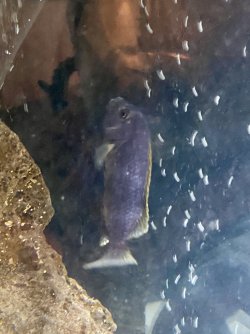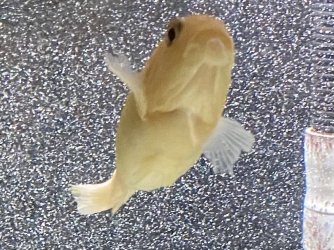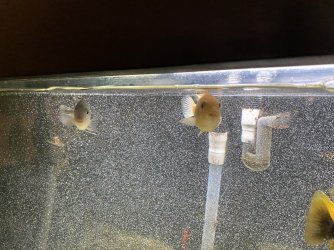Stargazee
New Member
- Joined
- May 29, 2019
- Messages
- 46
- Reaction score
- 3
I have been losing a fish every couple of months. I have 9 mbuna fish left (previously a chaos tank but do not want to introduce any more fish until this is solved), and a pleco in a 55 gallon with a FluvalSmart 706. I have 3 plants and barely any nitrates, 0 nitrites, 0 ammonia, ph 8.2. I rotate and recharge Purigen and carbon matrix and 1/4 water changes weekly with Sea Chem Prime.
Symptoms Include wasting away and fin degeneration. Some had lumps toward their back, 1 appeared to be blind but could have been from a bully? The blue one is currently swimming vertically nose up. None lost appetite. They eat Northfin veggie, repashy, cucumber, zucchini, peas red and green seaweed. I will include pics (dead orange one has white dots, that's just sand). Orange live one has a bump on mouth but also has been fighting a lot. Also if you look at my old post I had a pic of a Snow White that died with the same wasting. Please help!
Symptoms Include wasting away and fin degeneration. Some had lumps toward their back, 1 appeared to be blind but could have been from a bully? The blue one is currently swimming vertically nose up. None lost appetite. They eat Northfin veggie, repashy, cucumber, zucchini, peas red and green seaweed. I will include pics (dead orange one has white dots, that's just sand). Orange live one has a bump on mouth but also has been fighting a lot. Also if you look at my old post I had a pic of a Snow White that died with the same wasting. Please help!
Attachments
-
 554B6306-947A-4E3D-90CD-9B65EE2928FE.jpeg185.2 KB · Views: 112
554B6306-947A-4E3D-90CD-9B65EE2928FE.jpeg185.2 KB · Views: 112 -
 B1866E73-FBB3-4A83-8E9C-6DAEE8BB048C.jpeg307.7 KB · Views: 96
B1866E73-FBB3-4A83-8E9C-6DAEE8BB048C.jpeg307.7 KB · Views: 96 -
 DA62ED48-766E-4B9C-941F-E63E41B7A6A9.jpeg299.8 KB · Views: 87
DA62ED48-766E-4B9C-941F-E63E41B7A6A9.jpeg299.8 KB · Views: 87 -
 9F952BFA-7D03-44FF-BF99-7EF426DC7726.jpeg219.5 KB · Views: 109
9F952BFA-7D03-44FF-BF99-7EF426DC7726.jpeg219.5 KB · Views: 109 -
 C49A416C-1DA9-43C5-AA2A-912B2D2BADA0.jpeg246 KB · Views: 99
C49A416C-1DA9-43C5-AA2A-912B2D2BADA0.jpeg246 KB · Views: 99




